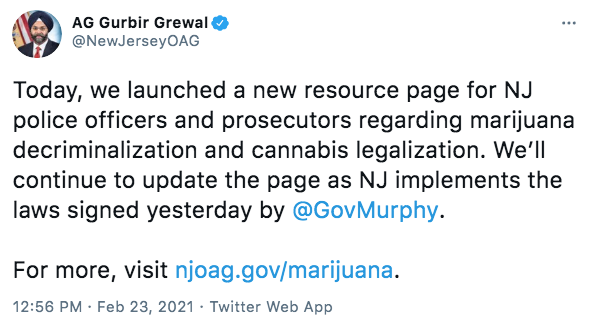The Cannabis Wire Daily newsletter is sent to C-Wire Plus subscribers every weekday morning at 7 a.m. Excerpts are published here later in the day. Don’t miss the full picture. Subscribe now.
New Jersey AG releases resources for law enforcement, post-legalization.
One day after Governor Phil Murphy signed adult use and decrim bills into law, New Jersey Attorney General Gurbir Grewal’s office unveiled a new resource page for law enforcement.
Further, after Murphy signed the bills, Grewal issued some interim guidance, which outlines the new, reduced penalties for those in violation of the new laws. He also issued a directive that “instructs state, county, and municipal prosecutors to dismiss charges pending as of February 22, 2021 for any marijuana offense that is no longer illegal under state law.”

Adult use bills advance in Minnesota, North Dakota.
Minnesota House Majority Leader Ryan Winkler’s adult use cannabis bill, HF 600, advanced (7-5) out of the Labor, Industry, Veterans and Military Affairs Finance and Policy committee on Tuesday. This follows its passage, earlier this month, out of the Commerce Finance and Policy committee. It now heads to the Workforce and Business Development Finance and Policy committee.
More than a dozen people spoke during the hearing, primarily in support, though a handful testified about potential mental and public health concerns. In the middle were those who weren’t necessarily championing legalization, but had specific asks should it move forward.
For example, Steve Kalina, the president and CEO of the Minnesota Precision Manufacturing Association, said that no matter what version of cannabis legalization advances, “we simply ask that it provides a better understanding of testing and impairment and support and guidance for employers.”
“We’re not looking to fight social battles. We understand there’s needs for cannabis,” he continued. “However, we need to make sure that employers have good guidance and good abilities to take care of their employees and ensure that they’re not at risk themselves.”
When public comment wrapped, Winkler responded to Kalina and said, “The bill, as drafted, permits employers who have safety sensitive positions to include cannabis testing as part of the criteria for being able to work.”
Winkler continued, “So we do preserve the right for employers to test for cannabis when it is appropriate to do so. But, like alcohol or prescription drugs, it is legal, it’s a legal substance, so simply having it in your system, if it is not safety related, is not grounds for termination or discipline in the workplace.”
In North Dakota, the full House passed HB 1420, an adult use legalization bill, and a related taxation bill. The votes were 56-38 and 73-21, respectively.
The sponsor of the adult use bill, Rep. Jason Dockter, spoke ahead of the bill’s passage about why he introduced a bill to legalize something for which he doesn’t care.
“I have many people wondering: why did I introduce this bill? And I think about that a lot. Why did I? But then I thought to myself, as lawmakers, what is our job? Our job is to create laws, for safety, for other issues. And most of the time we come here and we’re reactive,” he said. “Well I look at this as trying to be proactive. It’s not if it’s coming; it is coming, and it’s already here.”
Rep. Dockter then told a story about how the issue came up around a table with his family during Christmas, and he said that his father told him, “I don’t like it, but it’s coming, so why don’t you try to do something about it?”
He continued, “To put marijuana in the Constitution is just not right,” referencing a measure that some advocates are trying to place on the 2022 ballot, and added, “It states in there people can grow up to 12 plants. You want to talk about a black market?”
As Rep. Dockter wrapped up, he said, “We are trying to do something to make it as restrictive as possible, but allow people to adult use if they would like. Have I ever smoked marijuana? No, I have not. Do I like marijuana? No, I don’t. But our job as a lawmaker is to make laws and these are tough decisions.”
Cannabis continues to come up in confirmation questioning.
The latest example: US Senator Cortez Masto of Nevada asked Wally Adeyemo, who is President Joe Biden’s nominee for Deputy Treasury Secretary, about cannabis banking guidance.
“Do you believe Treasury should seek to update FinCEN’s 2014 guidance on,” Masto asked, “expectations for financial institutions that provide services to the cannabis related industries, and if so, what changes do you recommend?”
Adeyemo gave an overall open, albeit generic, response: “I look forward, if confirmed, to talking to my colleagues at Treasury about this important issue and thinking through what changes may be needed and doing this in a way that’s consistent with the agency and the president’s guidance. In doing that, I look forward to consulting with you and members of this committee on our path forward.”
+ ICYMI: As we noted in Tuesday’s newsletter, Merrick Garland, who was nominated to be Attorney General by President Joe Biden, responded to questions about cannabis during a confirmation hearing before the Senate Judiciary Committee.
South Carolina voters support medical cannabis legalization.
A poll of 801 registered voters in South Carolina, conducted by Starboard Communications, found that 72% support medical cannabis legalization.
As Cannabis Wire reported in our newsletter, lawmakers in both chambers of the legislature are pushing for the South Carolina Compassionate Care Act.






